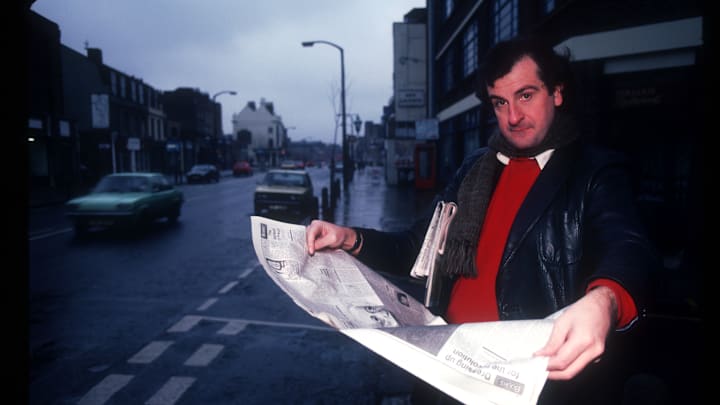I’m currently watching Season 18 on Blu-ray, Tom Baker’s final season as the Fourth Doctor. Overall, it’s a strong season, full of interesting ideas and a distinctive new style. It’s a strong start to John Nathan-Turner’s reign as Doctor Who’s longest-running producer, and along with new script editor Christopher H. Bidmead, both clearly make their mark on the show from the opening story. The special features for the box set make it clear why they wanted to change the show so much: both Nathan-Turner and Bidmead thought that the previous season had been too silly.
If I’m honest, it’s hard to disagree with that assessment. Stories like “The Creature from the Pit” and “Nightmare of Eden” had some great ideas, but both stories were let down by the monsters. (Especially the former – I’m not even going to begin to describe what the monster looks like in that one!) As for “The Horns of Nimon”, it’s entertaining, but in an extremely pantomime way.
On the one hand, you’d probably expect the season to be much stronger when you know who the script editor is: the legendary Douglas Adams. Perhaps best known as the creator of The Hitchhiker’s Guide to the Galaxy, there is no question that Adams was an incredible writer. But perhaps that was the problem. Because while other writers could try to follow his style, very few could match it.
Mixing comedy with story
What made Adams’s style so brilliant wasn’t just his comedy, although all three of his stories are undeniably witty and hilarious. No, it’s how well he balanced that comedy with a good story. This isn’t an easy balance to get right. Quite often, when writers try to include comedy in a Doctor Who story, there’s a very real danger that it can undermine the threat. After all, if your central hero doesn’t take a villain seriously, why should the audience? But Adams knew when to draw the line and make it clear when the audience should be afraid.
His first Doctor Who story, “The Pirate Planet”, is a great example. The first half of the serial gives us a gloriously over-the-top Captain, a robotic parrot, and even a quick moment when Tom Baker breaks the fourth wall!
But then we find out just how clever and dangerous both the Captain and his "nurse" really are. We find out about the numerous worlds that the pirate planet has destroyed, and we see how seriously the Doctor takes it. One of the story’s best moments is the Doctor raging at the Captain at the sheer pointlessness of all the destruction. Neither the writing nor Baker’s performance undercuts the seriousness of the scene, and it’s a great example of how fiercely moral the Doctor is.
The influence on the New Series
I’ve mentioned that very few writers can live up to Adams, but that shouldn’t stop people from trying to emulate his style. In fact, out of all the writers from the Classic Series, Adams’s style might be the most influential on the New.
When Doctor Who came back in 2005, it did so with a great sense of humor, especially in the opening episodes. While “Rose” included monsters that Robert Holmes had created, the episode’s style and sense of humor was clearly inspired by Adams. That continued with episodes like “The End of the World” and “The Long Game”. And while the season gradually got darker, you could still sense Adams’s style with other stories.
In fact, I’d say that the writer that’s come the closest to emulating Adams’s style – while still making it his own – is Steven Moffat. Yes, his stories could often be scary, but they could also be absolutely hilarious, too. Again, neither the comedy nor the horror undercut the other, giving us some brilliant stories in the process.
It’s a shame that Adams didn’t write more stories for Doctor Who. He might not have been the best fit as a script editor, but as a writer, he still stands out as one of the greatest.
